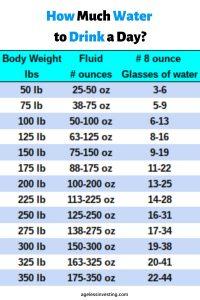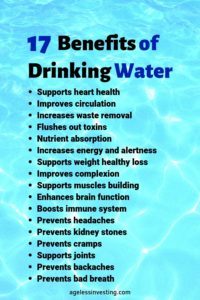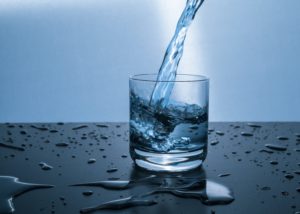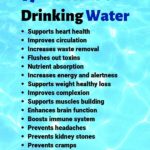Want to drink the amount of water for optimal health?
How much water you need to drink a day depends on many factors, such as weight, gender, activity level, and climate.
Generally, you should drink one ounce of water for every two pounds of body weight.
Drinking too much water is possible, but drinking too much water is generally safer than not enough.
Keep reading to learn when you should and shouldn’t drink water. And how to get clean water for free or for cheap.

Water Chart By Weight

How Much Water Should I Drink A Day In Ounces?
Ideally, you should drink at least one ounce of water for every two pounds of body weight daily. To do this, take your body weight and divide it by two. Because every person and situation is unique, your water needs change daily.
You may need to drink more water in a dry environment. You also need to drink more water when exercising to compensate for the water you lose.
How Much Water Do You Need to Drink Per Hour?
If awake for about 16 hours, you must divide the daily ounces by 16. For example, if you weigh 150 pounds, you must drink about 75 ounces daily. If you need 75 ounces daily, drink about 4.7 ounces every hour you’re awake.
How Much Water Should You Drink a Day in Litres?
You should drink at least 32.6 milliliters for every kilogram of body weight. For example, if you weigh 50 kilograms, you should drink about 1,630 milliliters (or 1.63 liters) daily at a minimum.
The easiest way to get enough water is to fill a large glass bottle in the morning with your desired amount. Try to drink the entire bottle throughout the day by pouring it into a glass or a water bottle.
How Much Water Should I Drink Calculator
For an in-depth water need calculation, check out this free hydration calculator (The link takes you to another screen to the hydration calculator). It factors your height, gender, weight, age, and other health indicators.
How Much Water Should I Drink to Lose Weight?
For weight loss, you must drink between one-half and one ounce of water per pound of body weight (3). If you weigh 150 pounds, you must drink between 75 and 105 ounces daily.
Drinking water helps you lose weight by:
- Speeds up your metabolism
- It helps you feel full
- Aids digestion

What Are the Health Benefits of Drinking Water?
- Supports heart health
- Improves circulation
- Increases waste removal
- Flushes out toxins
- Helps nutrient absorption
- Increases energy and alertness
- Supports weight loss and management
- Improves complexion (Skin and hair)
- Supports muscles building
- Enhances brain function
- Boosts immune system
- Prevents headaches and migraines
- Prevents kidney stones
- Prevents cramps
- Supports joints
- Prevents backaches
- Prevents bad breath
Further Reading: How to Get Rid of a Migraine Fast
You Are Mostly Water
- Your body is about two-thirds water
- Your brain and heart are (1) about 73% water
- Your lungs are about 83% water
- Your skin is about 64% water
- Your muscles are about 79% water
- Your bones are about 31% water.
Looking at the quantum level, you’re mostly energy. And water is at the heart of it all.
Water is vital for nourishing and regulating every cell in your body. First, water converts nutrients into an absorbable form. Then the blood, mostly water, transports the nutrients to every system. Your body uses water to regulate (1) temperature through sweating and respiration.
The brain uses water to manufacture hormones and neurotransmitters. Water also protects the brain and spinal cord by absorbing shock. Water lubricates joints. And water flushes out wastes and toxins.
Life depends on the transfer of electrons, an electric current. And water is (2) unique in that it is also responsible for the movement of positive charges related to protons.
Water transfers protons by a special kind of “jump conduction” down a chain of water molecules connected by hydrogen bonds. A proton enters at one end of the chain, and second exits at the other. Meanwhile, electrons move in the opposite direction.
Cells and molecules attract each other through electromagnetic fields, resonating at common frequencies. And water helps to match their frequencies so that molecular attraction and energy transfer can occur.

Symptoms of Dehydration
Symptoms of dehydration include (4):
- Thirst
- A dry mouth
- Infrequent urination
- Dark yellow pee
- Headache
- Muscle cramps
- Rapid heartbeat
- Dark sunken eyes
- Dizziness
- Rapid breathing
- Fainting
- Dry skin
How Drinking Water Helps You Stay Young
Every day you need to replace the water you use to survive. But if used correctly, water is also a tool that can help you stay young.
A “Water fast,” when you consume only water, gives your body time to eliminate wastes properly. Undigested waste products block nutrient absorption. Therefore your body absorbs nutrients better with proper waste removal.
Remember that you’re mostly water. Water keeps skin looking young, bones and muscles strong, and prevents fat storage. Stay young by giving your body what needs to replace about two-thirds of itself daily.
Dehydration can age you faster. Think of a juicy plum versus a dried prune. Every cell in your body is like a plum. Keep your cells young by staying hydrated.
It’s better to drink more water than not enough. Your body will use what it needs and remove what it doesn’t. Conversely, your body does not have much recourse when you consume too little water, only to protect vital organs. Consequently, your skin and muscles weaken, and your body builds fat cells to store the toxins it can’t remove.
How Water Affects Sleep
Not drinking enough water during the day can affect your sleep. Dehydration can dry your mouth and nasal passages and cause shallow breathing and snoring.
Dehydration and shallow breathing weaken your nighttime blood flow. Blood circulation regulates oxygen flow, nutrient transportation, and waste removal.
Your body heals and cleanses mostly during sleep. Poor sleep due to dehydration can affect your daytime energy, alertness, and cognitive function.
Start the morning with two to three glasses of water to hydrate and help flush out waste. Then drink water consistently during the day to meet your recommended amount before it’s time for sleep.
Drink less water in the last hour before bed to let your body relax for sleep. Also, drink more water earlier to avoid nighttime bathroom trips.
Take a couple of sips of water right before bed to keep your mouth and throat from getting dry.
How Much Water is Too Much?
Can you drink too much water? Yes, however, It is rare. Excess water intake can lead to hyponatremia.
Hyponatremia happens (4) when there isn’t enough sodium in the blood. It means that there’s either too much water or too little sodium. Sodium is an essential electrolyte for cell hydration, nerves, and blood pressure.
Hyponatremia generally is most common among those with small frames and extreme athletes. Symptoms of Hyponatremia Include:
- weakness
- fatigue or low energy
- a headache
- nausea
- vomiting
- muscle cramps or spasms
- confusion
- irritability
The best way to avoid drinking too much is to drink water consistently throughout the day. You should avoid drinking large quantities at any one time.

When Shouldn’t You Drink Water?
During certain situations, you shouldn’t drink a significant amount of water. Water can dilute your stomach acid, which is necessary for proper digestion and assimilation of nutrients. Stop drinking water at least a half-hour before eating and wait an hour after eating.
How to Get Healthy Water For Free
Use findaspring.com to search for a fresh spring near you. You can fill up on free spring water at one of the listed springs. Just select your country and state or province.
Why Is Tap Water Bad For You?
What assurances do we have that tap water is safe? Remember the lead contamination in Flint, Michigan? Or the children who developed leukemia from drinking tap water in Woburn, Massachusetts, in the 1980s. But we shouldn’t wait for a news story to make a change.
Industrial dumping, pesticide runoff, added chemicals or toxic pipes can contaminate tap water.
Water is treated with toxic chemicals to kill pathogens. However, even at small doses, these chemicals are poisonous to humans. Further, treated water travels through rusty pipes, contaminating water with heavy metals or toxic buildup.
Toxins found in tap water include:
- Chlorine
- Fluoride
- Lead
- Mercury
- Arsenic
- PCBs
- DDT
- HCB
Is Bottled Water Safe to Drink?
Plastic bottles leach toxic chemicals into the water. The plastic contains BPA, a cancer-causing estrogenic, which messes with your hormones and slowly poisons your body. Even “BPA-free” plastic bottles have similar toxins.
Plastic water bottles are not made safer. One dangerous chemical is replaced with another chemical that may even be worse than the other. When you drink water, it could’ve absorbed toxic chemicals for years.
If the only water you have available is in a plastic bottle, don’t hesitate. Staying hydrated is more important.
What is the Best Water Filter?
There are many water filter options available. I like to have different water settings. So I use a machine that produces high alkalinity, acidic, and neutral filtered water. I use filtered water for drinking and sometimes high alkalinity.
The acid setting is excellent for cleaning. And there’s one setting for cleaning your skin and one for cleaning surfaces. The setting for skin can cleanse your face better than any skin product. And the setting for surface cleaning can clean anything from glass to cars.
High alkalinity water also protects your teeth from acidic foods.
I use the Air Water Life Aqua Ionizer. This water filter connects to the faucet and filters and electrifies tap water. You can easily change the water’s PH from acidic, to neutral, to alkaline.
I use the filtered neutral setting and sometimes alkaline water for drinking. The acidic water setting is perfect for cleaning without the need for chemicals. I’ve used it to clean windows, cars, house siding, and carpets. What are the downsides?
The Cons of Air Water Life Aqua Ionizer:
- it is a little expensive,
- you need to change the filter about every six months
- It takes up some counter space.
- You must hook it up to a faucet.
Overall, having fresh water available at home every day is worth it.

How to Get Water in an Emergency
Like the air we breathe, we often take clean drinking water for granted. But many people don’t have access to clean water. And that number will grow as freshwater gets harder to find. Learn how to purify water in an emergency in this short video.
What is Distilled Water?
Distilled water is boiled into a vapor and cooled, and condensed back into a liquid. Distilled water is condensed into a new container. Any impurities that do not boil at or below the boiling point of water stay in the original container.
Distilled water is one of your best options if your water source is unsafe.
What Are the Benefits of Distilled Water?
The benefits of distilled water include the following:
- Free of heavy metals
- Chemicals
- Pathogens
- Parasites
What are the Drawbacks of Distilled Water?
- Distilling water removes trace minerals like calcium and magnesium. Without minerals of their own, distilled water can draw the minerals it needs from whatever it touches to maintain a balance. Distilled water could attract small amounts of minerals from your cells, like your bones and teeth.
- Fortunately, most of our minerals come from the food we eat. However, if you drink distilled water,, eat plenty of mineral-rich fruits and vegetables.
- Distilled water is difficult to store safely because it pulls toxins from its storage container more easily than regular water. Be sure to save distilled water in a glass bottle.
- Lastly, it has a comparatively bland taste as it lacks minerals.
What is the best Water Bottle?
Stainless steel bottles contain nickel, a toxic heavy metal. These bottles are best for camping or hiking, not for everyday use. Heavy metals can accumulate in the body, adding to your toxic load. Use glass instead.
An empty glass jar is free, but it breaks easily. But glass water bottles are available with outer protectors.
Cons of a Glass Water Bottle:
- They do not keep the water cool
- Glass can break, even with a protective sleeve
What is the Best Travel Water Bottle?
If you’re active and having water available is your priority, I recommend stainless steel over plastic. The Hydro Flask Stainless Steel water bottle is durable and insulated. It will keep your water cold, and you don’t have to worry about it breaking.
The only downside is that it is more expensive than other stainless steel water bottles.
Learn about water bottles in HOW TO CHOOSE THE BEST TRAVEL WATER BOTTLE FOR EVERY ADVENTURE.
Why You Need A Shower Filter
When you shower, your skin absorbs the water and all its toxins. Showering without a filter is similar to drinking a couple of glasses of tap water.
Furthermore, toxic gases are released into the air when water is heated. The effects of absorbing toxins are not immediate, but they’re cumulative.
How Many Ounces in a Water Bottle?
There are 33.814 ounces in a liter. A one-liter water bottle will hold about 33.814 ounces of water.
- .5 liter = 16.907 ounces
- 1 liter = 33.814
- 2 liters = 67.628
How Many Water Bottles Do You Need to Drink a Day
If you want to know how many water bottles you should drink daily, calculate how many ounces of water you should drink. Then, divide the ounces you need by how many ounces your water bottle holds.
Ounces per day/water bottle ounce capacity = how many water bottles you need daily.
How Hany 16.9 oz Bottles of Water Should You Drink a Day?
An average water bottle holds about 16.9 oz or 1 liter. Take your weight in pounds and divide by two. Divide this number by 16.9 to find roughly the number of 16.9 oz water bottles you should drink daily.
Your weight/2=ounces of water needed a day, ounces/16.9=number of bottles to drink daily.
How much of the brain is water?
The brain is about 73% water.
Conclusion: Why You Need To Drink More Water
- Water does more than hydrate you. It does everything from helping absorb nutrients to maintaining your energy flow.
- Because of water’s vital functions, drinking plenty of water is a priority.
- Since we need water daily, a good water filter is a good investment.
- Use a glass or glass water bottle for day-to-day water drinking
- Use a durable stainless steel bottle for your adventures
- Settle for a plastic bottle when you are out of options.
- What is your favorite water source? And what is your favorite water bottle?
You May Also Like the following:
How to Get Rid of Cold Fast: 25 Natural Remedies
Resting Heart Rate Chart | What is a Good, Normal, or High RH
Sources Cited
- https://water.usgs.gov/edu/propertyyou.html
- http://www.i-sis.org.uk/Life_is_Water_Electric_(part_2).php
- https://www.webmd.com/diet/features/water-for-weight-loss-diet#1
- https://www.webmd.com/a-to-z-guides/dehydration-adults#1
- https://www.healthline.com/health/hyponatremia#symptoms

Good article! Loved the link to look for springs near our location. I knew we had a few in Wisconsin, but there are 36 on the site. And I know of someone who has one on their farm which isn’t listed here, so 37 for sure!
Thank you! I wish I had one near where I live. Check back again, I will be updating this post as I learn more and discover more interesting ideas. And please ask a question if you want to know about something I left out.
EXCELLENT PIECE OF INFORMATION . GOOD JOB
Thank you, Kami!!!
hey,
thank for sharing great information . helpful for our health keep write these type article